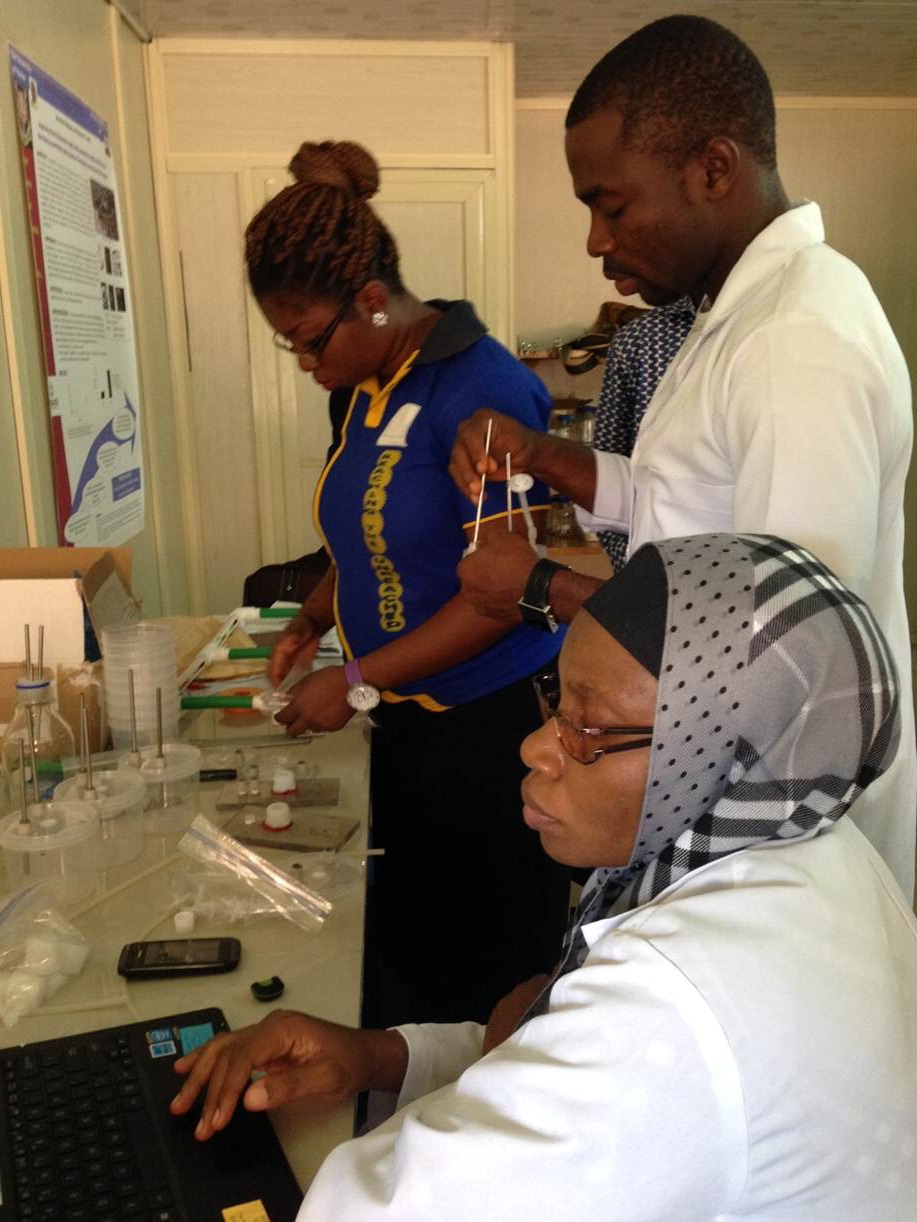|
|
Cycle 2 (2012 Deadline)
Improving yam (Dioscorea spp.) seed systems through production of dormancy-controlled seed tubers in temporary immersion bioreactors PI: Morufat Balogun (University of Ibadan)
U.S. Partner: Wayne Curtis (The Pennsylvania State University)
Project Dates: August 2013 to July 31, 2015
Project Overview

Dr. Balogun and team members set up Temporary Immersion Bioreactors(Photo courtesy Dr. Balogun). |
The production of yams, which are a food security and poverty alleviation staple in West Africa, is constrained by scarcity of planting materials and low multiplication rates, which account for up to 63% of production cost. Tuber dormancy also hampers out-of-season production, while uncontrolled sprouting after dormancy causes storage losses. The use of temporary immersion bioreactors in in-vitro cultures has been recognized as a means to improve plant propagation in other crops, and the idea is adaptable to hundreds of species. Temporary immersion facilitates scale-up of propagation of large masses of plant tissue, which is useful because it does not require costly agar, reduces contamination in cultures, and provides a means for sequential manipulation of the nutrient medium at different developmental stages with minimal labor input. The goal of this PEER project was to identify optimum conditions for production of seed tubers of white yam whose dormancy can be efficiently controlled. This research sought optimized protocols for seed yam production and increased seed supply and quantities. The immediate uses of the research results included micropropagation of disease-free plantlets, in vitro conservation of plantlets without losses associated with field collections, and in vitro evaluation of yield in transgenic yam. The potential uses of the results include out-of-season production and extension of the storage cycle. Ultimately, the overarching anticipated development impact is enhanced yam productivity will help feed Nigerians while also empowering them through trade. Final Summary of Project Activities The research team studied the growth of yam seeds in Temporary Immersion Bioreactors (TIBs) with various levels of sucrose and carbon dioxide. A sucrose medium formed more new nodes for a longer time than TIBs containing no sucrose. The team also tested different Co2 levels and the use of artificial and natural light in greenhouses. The healthy tubers from the initial harvest broke dormancy and were planted several months later. The team grew a total of 1167 plantlets both in conventional tissue culture and in the bioreactors, and tested automation of the TIBs.
The PEER team held a stakeholder workshop to discuss their results and yam production issues. A total of 165 participants were drawn from academia, farmers, civil society
groups, ministries, international organization, media, and government agencies at all levels. The use of temporary immersion bioreactors in order to speed up production of yam was hailed as a welcome development. Attendees offered a variety of comments on adjusting the technology or needed wider developments in Nigeria’s yam market, including support and education for youth and for smaller farmers, as well as cheaper and more reliable sources of power to manage the TIBs given irregular electricity.
The curriculum of an existing course for Master’s degree students at the PI’s institution now includes storage technologies, in vitro conservation, cryopreservation and freeze-drying. This was prompted by the increased visibility of the possibilities offered by in vitro techniques during the PEER project. Highlighting the importance of the work, in 2015 Dr. Balogun was also recognized as one of Nigeria's 50 most distinguished professionals in the Guardian newspapers, including a write up on yam research.
Back to PEER Cycle 2 Grant Recipients |
|
|
|




